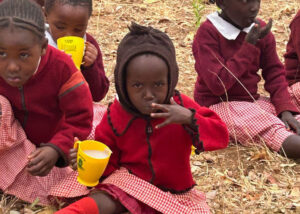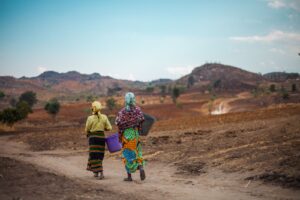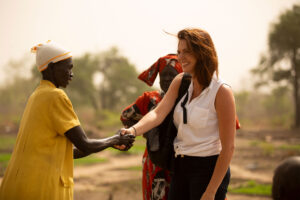
Betty Kibaara — Director of Food Initiatives, Rockefeller Foundation
Leading the Foundation’s investments in Africa, transforming food systems for children that increase access to nutritious foods.
Italy
Mood of Living April 19, 2017
When Ermenegildo Zegna opened a wool mill in Trivero, Italy, in 1910 he founded a family business that consistently honors his vision for sustainability, social well-being and developing local culture. In 2000, his granddaughter, Anna Zegna, approached her family to establish Fondazione Zegna, a non-profit collaborating with initiatives around the world that take the values of the Zegna Group beyond the local community. The Fondazione partners with projects that help people grow independently and autonomously and aims to champion younger generations.
For Anna, her dedicated grandfather and other family members who have built Ermenegildo Zegna into an international fashion force, are her primary influence for helping others. It is evident that her passion has been nurtured through an upbringing surrounded by their visionary work. She remains committed to sustainable development for her local community and creating similar opportunities around the world.
Mood of Living: What was your first job?
Anna Zegna: My first job was in PR with designer Gianni Versace. It was the late 1970s when Gianni was starting his unbelievable, creative career. It was a really great place to start. He was a genius; a very inspiring person who was surfing between different kinds of visual arts. He was incredibly innovative and a Greek-Italian melting pot much like we have in Calabria.
MoL: How have your past career experiences brought you to where you are now?
A.Z: Working with Versace was an inspiring start. Within the Zegna group, I was working on the combination of communication and creativity and applying these ideas to things like store design. I also worked with architect Peter Marino and Michelangelo Pistoletto, who is not only an artist but a visionary. Pistoletto creates movement that goes beyond art and his foundation has a great impact on the lives of people around the world, a great social impact.
I’m very grateful for this life and the opportunity I’ve had to encounter really inspirational people throughout the different stages of my personal life. I’ve learned such a lot from them. These people I have worked with through my career have been a great inspiration to me in building the Fondazione.
Anna’s grandfather, Ermenegildo Zegna, in the town of Trivero.
MoL: From the beginning, your grandfather and founder of Zegna, Ermenegildo Zegna was committed to ethical initiatives and business practices. How has his legacy influenced you and inspired you to create the Foundazione Zegna?
A.Z: I was born in a family where the founder of the Zegna business, Ermenegildo Zegna, was a man totally dedicated not only to his business, but also to the community. He was devoted to improving the quality of life of the people who worked in his factory. They lived in a very small, remote place, at the time between the two world wars in the 1930s. It was totally lacking in healthcare, there was no education, no facilities, it was very poor. My grandfather created his vision of the village. He really invented the landscape; not only the environmental landscape but the social landscape for the people in this area. This daily vision was part of my youth, of my childhood. When you’re small you don’t really understand or look at it from a mental point of view, instead you absorb the mood, the atmosphere, the approach and that has stayed with me.
The Fondazione is a totally independent organisation from Ermenegildo Zegna Menswear but it stems from the vision of the family business, and is supported financially by the family. People within the company really believe in the projects and have been sustaining the Fondazione from within. My husband, who is the CEO of the Zegna mill, saw the quality of the products that were produced through the San Patrignano recovery community, one of the organizations we work with, and so blended them with our own creative department to produce a small textile accessory collection.
The example of my grandfather first, and then of my father and uncle, encouraged me to propose to the family the birth, the creation, of the Fondazione Zegna. After 100 years of life, the ethical values that inspired the Zegna business are still being shared, though in a slightly different way. It’s a legacy that influenced us, absolutely.
Zegna has had a huge impact on the area of Trivero, including construction of roads and employment in the Zegna factories, that continues in the town today.
MoL: What is the mission of Fondazione Zegna?
A.Z: The values of my grandfather’s vision inspire everything along with quality, innovation and craftsmanship. We want to enhance the opportunities for people whether they’re inside or outside the company. When we talk about quality of life, the environmental approach, the cultural approach, the education, the health, the medical support; all of this is what a person needs around him or her to be able to blossom.
Beauty has many different forms but how can you inspire people to create beauty unless they live in an equally beautiful and respectful environment? This is really the core of our vision that we bring to projects which improve the quality of life for individuals and communities, protect the environment, develop human potential, and support scientific research.
Behind every project there is not only me. We are a community of souls who think along the same lines, otherwise it would be difficult to do what we do. It’s like the law of attraction and we want to attract productivity. Our days are really full because we are passionate about what we do and that would never have been possible unless I had the experience of being born into a family working in textiles and a truly inspiring grandfather.
Fondazione Zegna supports organizations around the world that work in culture, healthcare and the environment. This includes Fondo Ambiente Italiano (FAI) The National Trust for Italy.
MoL: How is Fondazione Zegna’s focus changing with current affairs?
A.Z: There is so much variation according to where the project is taking place, whether it’s in Italy, China, Africa or in a specific moment in time. If I look at the reality of Italy in the last five years, we are addressing issues we would have never thought of addressing. Problems such as refugees used to be part of far away worlds, but today it is one of our daily social problems. We need to adapt and be flexible in our approach to sustain the right project at the right moment.
We started a project two years ago in Sicily to help minors that are arriving on the Italian coast from Syria or Libya. This is addressing an Italian problem but it is also addressing a Mediterranean problem. It’s important to look at the crisis in a global way, a rounder way. We do not necessarily have to be present in every country in the world, but we must face global issues.
In my grandfather’s time, the focus was largely on a medical approach. Today, health is more advanced and the science so complex. We are adjusting to medical initiatives that give short to medium term help. Our approach is based on co-creation, where all the partners in a specific project collaborate to find new solutions. We are bringing together the stakeholders who share a common goal. The participation of those who are receiving the care is vital to the process.
Oasi Zegna is a nature park in the Biella Alps created by Ermenegildo Zegna.
MoL: What is the foundation’s vision for being socially and environmentally responsible in the projects it builds?
A.Z: One of my favorite philosophies is ‘give them a fishing rod and not a fish.’ If you give someone a fishing rod, they will be able to sustain themselves in the long term. You need to teach, to educate, to partner with people. This is our message today because there are too many social issues around the world for governments alone to address.
We strongly believe in collaboration where the stakeholders have an important role in today’s action towards a positive economy. It is not about returns and shares but about cooperation. That is what inspires our projects today because it is, first and foremost, about being sustainable.
MoL: You are heavily involved with non-profit organization San Patrignano alongside Barbara Guarducci. How are creativity and craftsmanship incorporated into this philanthropic work?
A.Z: There are two key things to the San Patrignano initiative, a rehabilitation community in Italy. One is craftsmanship and the other one is the value of the person. When you bring the two together, with the third little magic word which is creativity, you can really transform a situation with no way out into the rebirth of a person. In difficult circumstances, there can be a loss of identity but these projects give the opportunity to be born again.
The creative process is rediscovered daily with love, attention and care. Somebody who has been totally lost can find self-esteem, strength, positivity and enhance their talents. There is more to the beautiful product created through San Patrignano because when someone is at the loom, they’re weaving their new life. It is amazing that, in a way, a technique almost as old as man, is actually weaving the future. The thread may have been undone but through the creative process and starting again, it’s possible to build up the thread, and your life, again.
We all need love and when you buy a product made through our projects, you feel you are a part of something bigger than you. It’s not just a scarf you are buying but a vision. You are buying something made with love that is a small part of a bigger project.
San Patrignano supports the community through creating textile products.
MoL: What inspires you about the people you are able to help through the Fondazione?
A.Z: Over our entire lifespan, the most challenging thing that a human being has to find is the reason why we are here. What is our life purpose and what are our talents? I love this very dramatic, classic definition, a Greek myth, that we have a diamond that is like our soul. Before coming back into the world, one has to bathe in the river of oblivion, the Lethe, and in this moment you forget everything and you come to life.
Over the years, working with San Patrignano, I have seen with my own eyes the girls that have found their passion, their unique enthusiasm. It’s something they did not think they could have in the midst of a challenging experience such as drug addiction. We should never stop in front of challenges or defeat but I think you need a hand to help you in order to get out of suffering. And this hand is given through the beautiful people who are supporting and devoting every day of their life to San Patrignano.
MoL: How can the individual make a difference to their own local community?
A.Z: Today, in any country, in any town, you can find something that relates to who you are. I don’t think we have to go abroad to have an impact on someone in this life. There is not a specific recipe. The biggest recipe is love. It’s important to consider how much you are committed to step out of your small individual life and be generous, to offer yourself to somebody in need. In everyday life you should listen first to who you are and what your passion is. Is your passion nature? Is your passion craftsmanship? Writing, sports, health, kids, people, pets…? In any area you can find something that connects to your heart if you are open to give and receive.
There are so many actions we do everyday that can help others. The more you give, the more you receive. I don’t think it should be something you feel obliged to do but it stems from your personal awareness.
Human beings are social animals. I think we are in a strange phase of our life because we are at the peak of technological connection and we are at the bottom of human connection. I think that we need to get back to connecting humanity with technology. It is not a negative weapon but an extraordinary opportunity, as far as you handle it with care.
Casa Zegna is a historical archive and culture center in the town of Trivero.
MoL: What is your home life like?
A.Z: My life is a life of a very normal Italian human being who lives in a beautiful country, wakes up early in the morning and works all day. Italy is a beautiful place where we eat very well, and drink very well, and are surrounded by beautiful hills and sea. I have four dogs who I love, I practice yoga, I eat well, I grow my own vegetables and I spend as much time as I can in nature with my husband and my dogs, but it’s nothing special. At the end of the day, what’s really me is the projects I work with every day, and that is the most important part.
Photography courtesy of Anna Zegna

Leading the Foundation’s investments in Africa, transforming food systems for children that increase access to nutritious foods.

charity: water — A non-profit organization founded in 2006 by Scott Harrison.

Founder Treana Peake, supports artisan partnerships and funds development work through the Obakki Foundation.